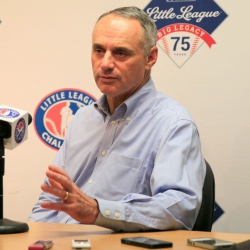
Manfred Told ESPN’s Outside The Lines, “Gambling in terms of our society has changed its presence on legalization.”
American states are losing the proceeds of an estimated $12 billion a year industry by banning sports betting, according to one global gaming research company. GamblingCompliance estimates $95 billion is going to be gambled in 2015 on bookmaker activity, though the vast bulk of that gaming will be off-the-books and illegal.
If one assume an industry average state tax assessment, individual U.S. states would net several billion dollars. The GamblingCompliance report calls U.S. sports betting a “sleeping giant”. The study shows that the United States could be the top sports betting market in the United States, if the federal ban were overturned.
American Gaming Association Statement
Seizing on the report, the American Gaming Association called this week for the U.S. federal government to repeal the Professional and Amateur Sports Protection Act of 1992. The PASPA maintains a federal ban on sports betting, except in four states. Three of those states (Delaware, Oregon, Montana) have sports lotteries, while Nevada has full legalized sportsbooks–a virtual monopoly in the United States.
The AGA’s president, Geoff Freeman, released a statement which underscored that monopoly, while pointing out that the 23 year ban has not worked.
Freeman wrote, “Illegal sports betting is reaching new heights of popularity in America. It’s clear that a federal ban on traditional sports betting outside of Nevada is failing.”
Betting through Bookies
Of the estimated $95 billion being wagered, the vast bulk of that money is wagered through local bookmakers called “bookies”. Las Vegas, which recorded a record year in 2014, collected only $227,000,000 in winnings.
To Geoff Freeman and others who support the end of the federal ban, it makes no sense to ban sports bets, when it is obvious that prohibition does not work. Americans love to gamble on sporting events and they’re going to do it, whether the U.S. government bans it or not.
UK vs US Sports Gaming Markets
The United Kingdom’s sports betting market is known the world over for its famous bookmakers and their unconventional proposition bets. The US market would be five times the size, given the larger population, higher level of affluence, and year-round obsession with sports. The US market would bring in revenues 11 times larger than those collected by Italian sportsbooks.
Even more, American sports leagues are turning their noses up at gaming proceeds. The most successful US sports league is the National Football League, which organizes American football at the professional level. The NFL generates more than $12 billion in annual revenues (mostly from TV contracts), of which $7.2 billion is shared between the various franchises.
NFL the Key to Ending PASPA
If the NFL and other US sports associations embraced a regulated sports gaming market, the $12 billion in legal revenue the sportsbooks would generate would have more than enough money to give even the NFL a tremendous influx of cash. That is the main reason why NBA Commissioner Adam Silver wrote in late-2014 that sports gambling is inevitable in the United States, and the NBA supports legalization and federal regulation of sportsbook (where it would be easier for the NBA to collect its share of the money).
Major League Baseball commissioner Rob Manfred has stated he plans on talking to baseball owners about changing their stance on sports betting, for the same reason. Gary Bettman, the NHL commissioner, says his league is less affected than the other three of the “Big Four” sports. Bettman suggested he would defer on the issue.
That leaves NFL Commissioner Roger Goodell. The time might be right for the NFL to embrace sports betting. As the US sports media is happy to report, Roger Goodell has bumbled from one scandal to the next over the past year. When he faced calls to resign from his office, Goodell received support from the NFL owners, because he had greatly increased revenues during his 10 years in office. Embracing sports gambling would allow Goodell to pull off another such miracle–and perhaps just in time for a new term (his $40 million contract end in 2017).
